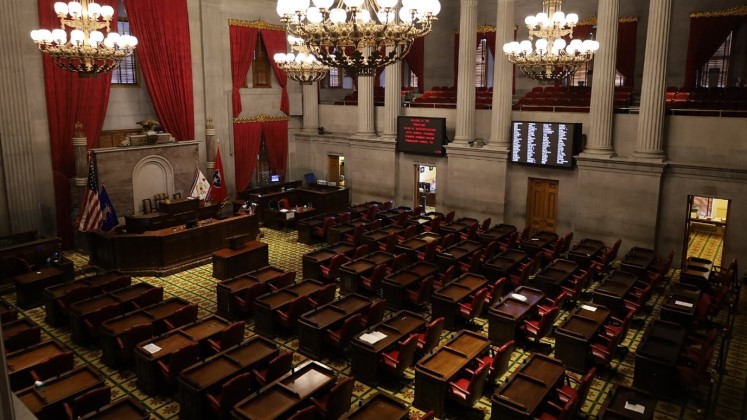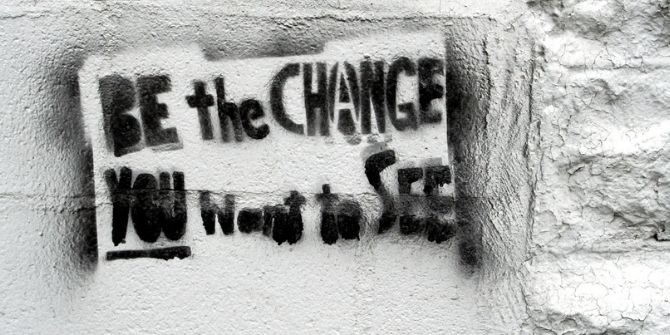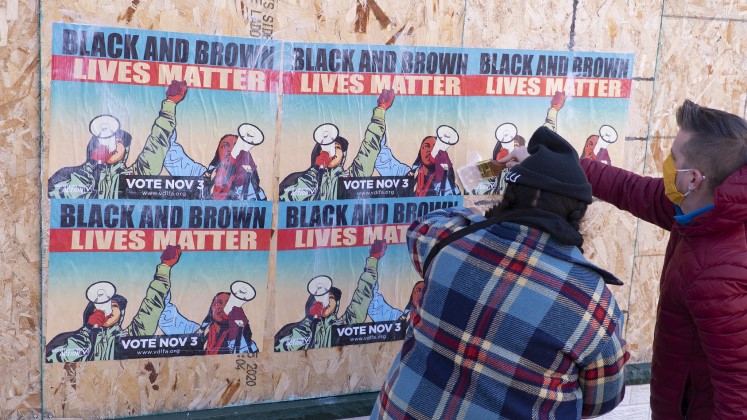 Recent years have seen growing concerns among social scientists about the seeming erosion of democratic norms in the US. In a new study, Andrew Thompson and co-authors examine the influence of white Americans’ sense of racial threat on attitudes towards political violence. They find that when prompted to think about racial demographic change in the US, many white Americans express clear anti-Black, violent sentiments about how the country is changing. He writes that these findings may show that extreme views across the public on race may be more common than many media commentators have thought.
Recent years have seen growing concerns among social scientists about the seeming erosion of democratic norms in the US. In a new study, Andrew Thompson and co-authors examine the influence of white Americans’ sense of racial threat on attitudes towards political violence. They find that when prompted to think about racial demographic change in the US, many white Americans express clear anti-Black, violent sentiments about how the country is changing. He writes that these findings may show that extreme views across the public on race may be more common than many media commentators have thought.
Scholars of political science and the social sciences generally have been asking questions about the root causes of the erosion of democracy in the US. The public is seemingly moving away from previous, longstanding ideals of civil dialogue in politics, the peaceful transfer of power in democratic elections, a trend which reaches all the way to calling into question the full functioning of American democracy. Recent work has shown that feelings of racial threat about the changing country is motivator of these attitudes. Importantly, these works have mostly approached the idea of racial threat in general ways, describing how the threat comes from a shrinking white American population or describing how racial minority groups overall are projected to become the majority. These works have been couched in Census projections about the changing country and extended from this point.
We take a different approach in directly asking Americans what comes to mind on a mass level, instead of attempting to project our understanding of what they are thinking about. This leads to a radically different conclusion, but one that meshes deeply with American racial politics. Simply put, a strong driver of democratic erosion in America is the fear of Black Americans having political power. This notion connects deeply to the historic role of race in the US and goes to show that contemporary changes to the racial landscape are less potent in affecting threat as are historical forces. The population of Black Americans is not anticipated to grow significantly, nor has this group made socioeconomic gains. As such, there is less of a case to be made about the public feeling a mounting threat from Black Americans over Latinx or Asian Americans, who are growing.
Racial threat and democratic erosion
In new research we show that the American public by and large consider Black Americans when they think about the changing country. This sits outside of the bounds of what previous research has shown on these ongoing changes because of the consistent attention that has been given to the empirical projected changes to US racial demography. We go further to show directly that these strong senses of Black racial threat also increase support for political violence. So, we causally connect racial threat here to democratic erosion. Americans, many white Americans but not limited to white Americans, feel politically threatened by Black Americans, and when they are prompted to feel threatened, they become significantly more violent.
To approach how the public thinks about racial demographic change from the top of their mind, we ran multiple studies where we asked Americans the following question: “You may have heard about the diversification of the United States. Tell us what immediately comes to mind when you think about racial demographic change within the US (Please tell us in at least 2 sentences).” The following quotes are direct responses from these studies:
the balance is being tipped toward Blacks. The violence of Blacks in this society accomplishes little. All it does is ruin people’s lives
America is ‘Browning’. While that is not necessarily a bad thing, it may cause the slow extinction of the white race. While I disagree with eugenics, I understand why it was implemented in the past.
The ongoing decline of the United States across the board is directly proportional to the rise in racial demographic change. Black racism and extremism has been mainstreamed as something to be celebrated and is regarded generally as something noble and good. Scott Adams IS right.
We do not attempt to activate anything directly political within the prompt. Respondents are simply bringing to bear what they are immediately thinking about on the diversification of the United States. Despite this, it leads Americans to express clear anti-Black, violent sentiments about how the country is changing. Some Americans even go as far as to express ideas about civil war: “I do not agree with the diversification. US is going to hell. If people don’t get together and fight for what is right we will go to war.”

“Return America Rally (2021 Oct)” (CC BY-NC 2.0) by Anthony Crider
These verbalized responses give us a very clear picture of how the diversification of country is threatening Americans who are happy to express themselves, but what of people who cannot or refuse to express these same ideas in fear of being outed or are unaware of how they’re activated? For an even more robust set of tests of support for violence, we use closed-ended, quantitative measures. Along these, we find that respondents prompted with the diversification question described above are expressively more violent, compared to those who do not receive the question, shown in Figure 1 below.
Figure 1 – Study 1 and Study 2

Moreover, we find in similar closed-ended measures of Black threat, versus Asian and Latinx threat, that this prompt only actives threat from Black Americans, shown in Figure 2 below.
Figure 2 – Comparing expressions of threat

Perceived threat means Black Americans are more vulnerable to violence
Overall, our results advance the same point further, which is that ideas of the US changing drive violent attitudes and that one key place where these views come are on Black Americans. Implications abound from this conclusion. First, when it comes to anticipating individual violent responses, our results call to more attention to Black Americans being the target of violence. Discussion on racial minority groups being the targets of white supremacist violence and domestic terrorism has emerged in recent years, but our work gives more reason for specificity in the vulnerability of Black Americans because they are viewed so directly as threats.
Second, when interpreting language from elites about the changing country, media and scholars ought to think outside of the simple context of what is being said explicitly and implicitly. Dog whistles are more readily emphasized in coverage of elite messaging in contemporary American politics, but this immediate attention to what is being said by elites could miss how the public is interpreting the message. Black Americans have historically been at the fore of discussion of racial threat, which we argue is embedded in the minds of Americans. The historical context here is much more useful in understanding what the public thinks about than simply the words that are being used by a given political elite at any one point in time.
Third, our studies use a light-touch yet still draw out extreme attitudes. This could indicate that extreme views across the public on race are strong and top-of-mind in a much stronger fashion than media often display. To summarize, Americans could be more extreme and averse to multiracial democracy than many have considered.
- This article is based on the paper, ‘Anti-Black Political Violence and the Historical Legacy of the Great Replacement Conspiracy’, in Perspectives on Politics.
- Please read our comments policy before commenting.
- Note: This article gives the views of the author, and not the position of USAPP – American Politics and Policy, nor the London School of Economics.
- Shortened URL for this post: https://wp.me/p3I2YF-dYF






